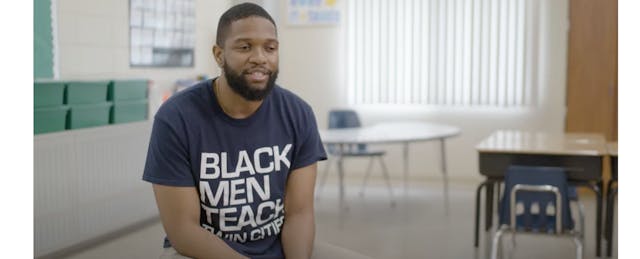In a fifth-grade classroom at Monroe Elementary School near Minneapolis, a teacher named Thetis White was recently celebrated, while his students and a camera crew looked on.
The teacher was being presented one of those giant ceremonial checks, as if he’d won a sweepstakes. The check was big—for $50,000. But this was no raffle prize.
White had overcome great odds. As a Black man teaching in America, he is part of the 2 percent of the teaching workforce that fit that demographic.
The check is to pay off his student loans, to make his choice of a career in teaching less of a financial sacrifice.
The person handing out the check was Markus Flynn, executive director of the nonprofit Black Men Teach, which supports Black male educators. Flynn is one himself—as a part-time teacher in a Minneapolis school.
EdSurge sat down with Flynn for this week’s EdSurge Podcast, and you’ll hear that he chose to come to Minnesota because it is known for both generally excellent schools and its poor track record for serving students of color.
Before switching to a career in education, Flynn studied to be an epidemiologist, where experts look for small interventions that can have large impacts on public health. And he says that employing more Black male teachers is the educational equivalent of a small change that yields big wins as far as student success.
One study he cites shows that if a Black student has one Black teacher by third grade, then they are 13 percent more likely to enroll in college. Black students who have two Black teachers by then are 32 percent more likely to go to college.
“When I started looking into education studies I saw some of the most compelling statistics I've ever seen—in any field,” Flynn says.
So he moved to the Twin Cities, started teaching, and this January took the helm at Black Men Teach.
Get the EdSurge Podcast in your email inbox: Sign up to receive the EdSurge Podcast newsletter every time new episodes appear, plus you’ll get links to related resources and EdSurge stories.
Giving out big checks to pay off student loans is only part of the solution, according to Flynn. To make lasting change, he believes, the cultures of schools need to change as well.
He remembers an incident from his own fifth grade year that soured him on the idea of ever going into education. He owned a red bike, and police and school officials accused him of stealing it. They put him in a police car and were going to take him in until his mother intervened.
“I call it, like, school-induced trauma,” Flynn says. “I think if you talk to almost any Black man, they can give you an experience of something that stuck with them for a long time, a very memorable experience that happened in school” where they were treated unfairly because of their race.
He worries that his Black students today could easily face a similar situation. In Minnesota, Black boys are eight times more likely to be suspended and expelled than white ones. “They represent 10 percent of the student population but 42 percent of the discipline incidents,” Flynn says.
He does think things can change for the better, though.
“I think it’s a matter of time,” he says. “A place like Minnesota is actually a place that should be the first place looking to change because the outcomes are so disparate and it's so obvious. And in Minnesota right now, it's the hub when it comes to like this focus on equity and justice, given the murder of George Floyd and Daunte Wright. And so this is a place where the work really needs to be done.”
And he says there are resources and political will for change. “Minneapolis has the most nonprofits per capita. The money is here, even in education,” he adds. “There are so many people who are motivated and inspired to see change, that think things will be different.”
Listen to the episode on Apple Podcasts, Overcast, Spotify, Stitcher, Google Play Music, or wherever you listen to podcasts, or use the player on this page.


